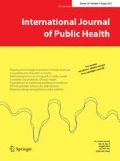Summary
Objectives
To derive and assess the validity of an Australian version of the SF-12 quality-of-life questionnaire.
Methods
Using regression methods and structural equation modelling to obtain item weights, an Australian version of the SF-12 was derived from Australian population survey data and compared to the existing United States (US) SF-12 variable set.
Results
The Australian version of the SF-12 explained 94% of the variation for physical components summary (PCS) and the mental components summary (MCS) of the SF-36 questionnaire. There was high level of agreement on the MCS and PCS summary scores between both versions of the SF-12 and the SF-36.
Conclusions
Although it is possible to derive a valid Australian version of the SF-12 it is concluded the US version of the SF-12 be used for reasons of international comparability, but using item weights derived from structural equation modelling.
Zusammenfassung
Fragestellung
Eine australische Version des SF-12-Fragebogens zur Erfassung der Lebensqualität ableiten und dessen Validität beurteilen.
Methoden
Unter Verwendung von Regressions- und Strukturgleichungsmodellen zur Bestimmung von Gewichtungsfaktoren wurde eine australische Version des SF-12-Fragebogens abgeleitet. Hierzu wurden Daten einer Befragung der aus-tralischen Bevölkerung herangezogen. Der australische Fragebogen wurde anschliessend mit dem bereits bekannten U.S. SF-12-Variablensatz verglichen.
Ergebnisse
Die australische Version des SF-12 erklärte 94% der Variation für die physische (PCS) und psychische Summenskala (MCS) des SF-36-Fragebogens. Zwischen den beiden Versionen des SF-36 und SF-12 stimmtem die MCS- und PCS-Summenwerte sehr gut überein.
Schlussfolgerungen
Es ist möglich, eine valide australische Version des SF-12 zu erhalten. Aus Gründen der internationalen Vergleichbarkeit ist es jedoch besser, die U.S. Version des SF-12 einzusetzen, aber unter Verwendung von Gewichtungsfaktoren, die anhand struktureller Vergleichsmodelle abgeleitet wurden.
Résumé
Objectifs
Etablir une version australienne du questionnaire SF-12 sur la qualité de vie et évaluer sa validité.
Méthode
A partir de méthodes de régression et de pondération par des modèles d'équations structurelles, une version australienne du SF-12 a été établie à partir d'une enquête de population et comparée avec l'ensemble des variables composant la version nord-américaine existante du SF-12.
Résultats
La version australienne du SF-12 expliquait 94% de la variation du score synthétique physique (PCS) et mental (MCS) du questionnaire SF-36. Il y avait un haut niveau de concordance pour ces deux scores entre les deux versions du SF-12 et du SF-36.
Conclusions
Bien qu'il soit possible d'établir une version australienne valide du SF-12, l'utilisation de la version américaine du SF-12 peut être utilisée pour des raisons de comparabilité internationale, mais en utilisant un système de pondération spéifique basé sur des modèles d'équation structurelles.
References
Arbuckle JL, Wothke W (1999). Amos 4.0 user's guide. Chicago: Small Waters Corporation.
National Health Survey (1995). SF-36 population norms Australia. Canberra: Australian Bureau of Statistics.
Gebski V, Leung O, McNeil D, Lunn D (1992). Spida users manual. New South Wales: Statistical Computing Laboratory.
McCallum J (1996). The shorter form: analysis of SF12 items in Australian data: proceedings. Canberra: Integrating Health Outcomes Measurement in Routine Health Care Conference.
Simon GE, Revicki DA, Grothaus L, Von Korff M (1998). SF-36 summary scores: are physical and mental health truly distinct? Med Care36: 567–72.
Ware J, Kosinski M, Keller SD (1996). A 12-Item Short Form Health Survey: construction of scales and preliminary tests of reliability and validity. Med Care34: 220–33.
Ware JE, Kosinski M, Keller SD (1995). SF-12: how to score the SF-12 Physical and Mental Health Summary Scales. Boston, Mass: The Health Institute, New England Medical Center.
Ware JE, Snow KK, Kosinski MA, Gandek B (1993). SF-36 Health Survey manual and interpretation guide. Boston, Mass: The Health Institute, New England Medical Center.
Wilson D, Parsons J, Tucker G (2000). The SF-36 summary scales: problems and solutions. Soz Praventivmed45: 239–46.
Wilson D, Wakefield M, Taylor A (1992). The South Australian Health Omnibus Survey. Health Promot J Aust2: 47–9.
Author information
Authors and Affiliations
Corresponding author
Rights and permissions
About this article
Cite this article
Wilson, D., Tucker, G. & Chittleborough, C. Rethinking and rescoring the SF-12. Soz Präventivmed 47, 172–177 (2002). https://doi.org/10.1007/BF01591889
Issue Date:
DOI: https://doi.org/10.1007/BF01591889

